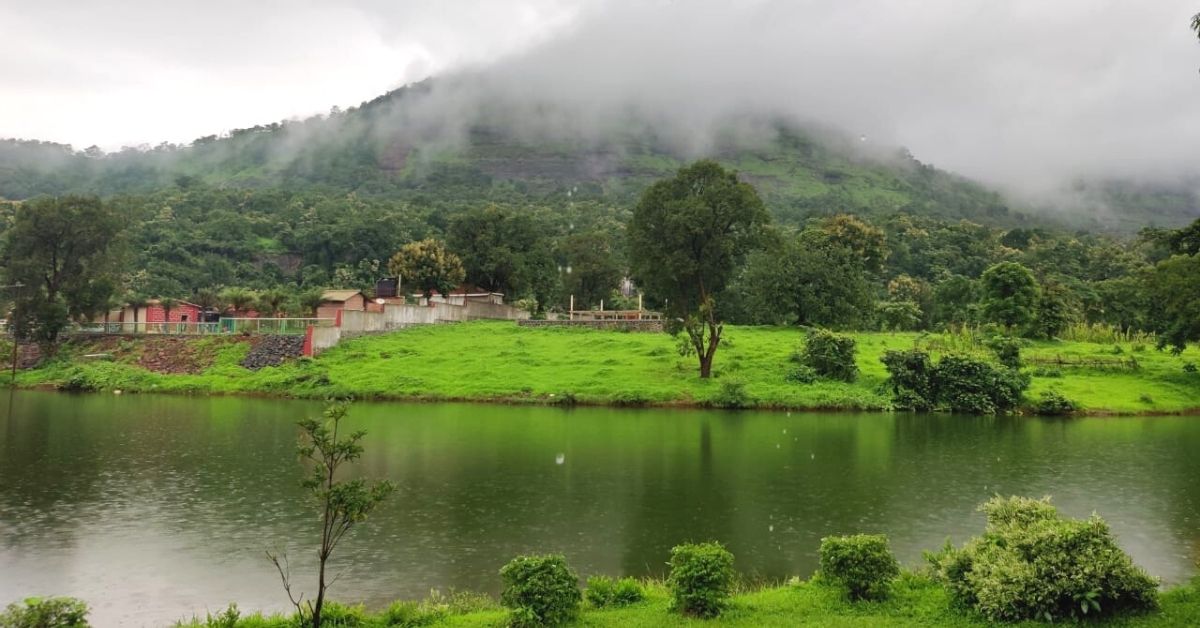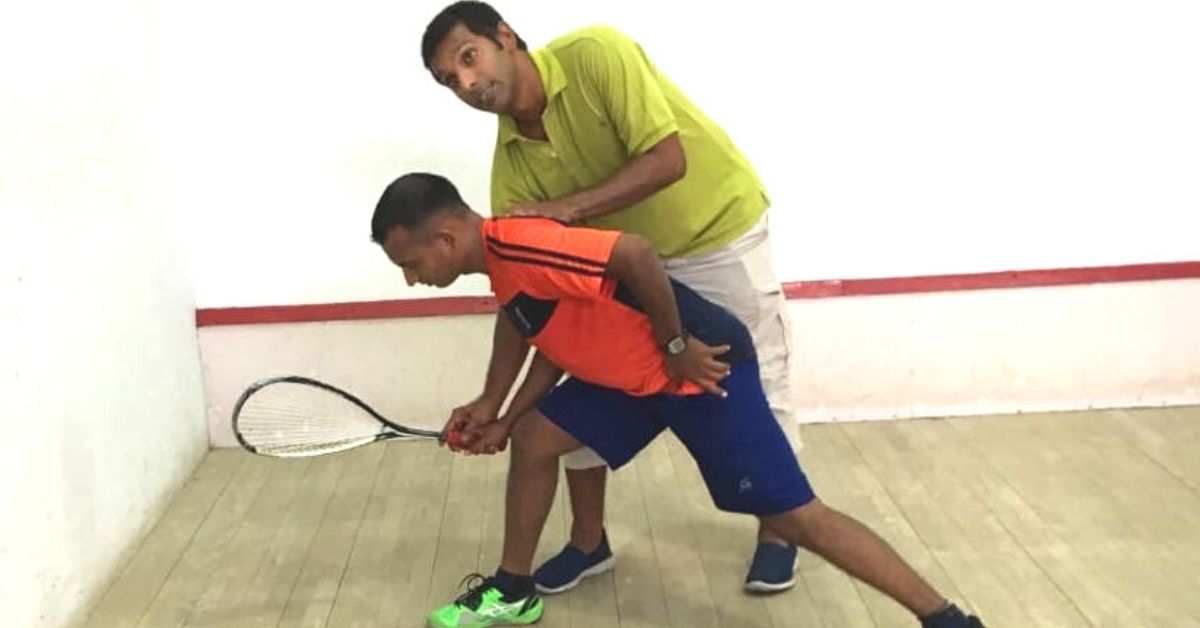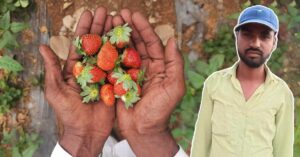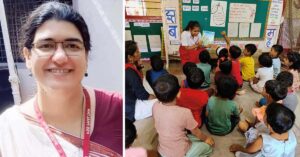One Man’s Vision Turned a Remote Tribal Village Into Maharashtra’s Squash Capital
Ritwik Bhattacharya, who retired from playing squash a decade ago, started Squash Temple and Real Training (START) Academy at Kalote-Mokashi village in Maharashtra. Today, he has trained over 100 players from the tribal village

Kalote-Mokashi, a village nestled around 70 km drive from Mumbai, in Raigad taluka, is a much sought after destination for urban dwellers looking for a weekend getaway to unwind from their hectic work schedules.
The tribal, village with a population of around 2,000, overlooks lake Kalote with its quiet and serene landscape. However, for a village that people visit to experience traditional rural life, its children are tightening their grip on squash rackets.
About 200 players from the academy, out of which over 100 from the village alone, train day and night to master the two-player sport that involves a racket and a hollow ball played in a four-walled court. The game’s objective is to beat your opponent by hitting the ball on the wall in front so as to make it difficult for the other to play their turn.
But the villagers have risen to fame on the squash scoreboard all thanks to the five-times National Squash Champion Ritwik Bhattacharya, who established Squash Temple and Real Training (START) academy that has rolled out 42 national players in the sport. The Professional Squash Association (PSA) World Tour star visited the village after his retirement in 2010 and bought land to start an academy in 2017.
‘Never Heard of the Game Before’

Ritwik tells The Better India that post-retirement, he set up academies and squash training camps in Bombay Gymkhana, Otters Club and Cricket Club of India (CCI). “However, the urban setup does not offer the liberty of space and time. The players receive training for a fixed amount of time in a day, and the cities face space limitations to accommodate a sports facility,” he says.
Moreover, Ritwik believes that the talent for promising players lies hidden in rural India. “The talent from the non-urban areas remains untapped, and the players from the rural areas show more willingness to invest in the sport,” he says. It was then that he decided to establish an academy in the rural area and set it up in the village with the help of co-founders Munish Makhija and Sridhar Gorthi.
The 41-year-old says he knew that the players could fully immerse themselves, away from the distractions of city life. “I started building a relationship with the village children playing football and other games. The four-acre land I purchased had only a hut and a toilet. Eventually, I constructed a squash court and introduced the children to the sport,” he says.
Ritwik says that the amount of land purchased was a luxury, and children of all ages could come and play anytime during the day. “There were no restrictions and children could play before or after school or even in the late evening hours. They started performing within a few months. In 2017, four players participated in a tournament at Ajmer [Rajasthan], while in the following year, 12 of them participated in Jaipur at the National Squash Competition. A year later, 42 players represented the national junior championship in Chennai and Pune,” he says.
Ritwik says that these players ranked 13, 16 and 17 in their respective categories of junior and senior levels. “Four of them qualified for the PSA world tour, an international squash competition organised by the association. However, the pandemic put a stop to the participation,” he says.
Bijli Darvada, a native of the village, who achieved 339 world rank says that the sport has made her fearless and given her confidence at a personal and professional level. “We had never heard of the game before it was introduced to us. Many children from the village did not travel outside, but the game offered us the opportunity to travel and explore,” she says.
Bijli says that the children in the village were not well-versed with English. “The academy has helped us understand and speak fluent English. We also travelled by air, which is a unique experience for people living in the village,” she adds.
Yuvraj Wadhwani has been in training with Ritwik since the last four years. He describes the training as ‘phenomenal’. Apart from winning National titles in his junior year he has also won gold at the Asian Junior Championships in the Boys Under 13 category. He also won bronze at the British Junior Championships.
“Coaching at Kalote Mokashi involves fitness as well as squash. It’s hard work and fun at the same time. My coach is also a great mentor and the kids love it there,” he says.
Aspiring players from nearby cities started training in the village too. Arnav Mandhana is a player who feels that the location helps to focus more on the game. “The set-up is rustic, and the tranquillity of the location allows one to concentrate on the game. Training at the academy has certainly made a positive impact on the performance,” he says, adding that he can train for long hours without the worry of other commitments.
An Academy Like No Other
Arnav describes the training at the academy as a unique experience because of the team spirit. “Everyone is constantly helping others improve and the competition is very healthy and motivational,” he says.
Riwtik says that players from the Rashtriya Indian Military Academy, National Defence Academy and cities like Salem, Pune, Mumbai and New Delhi also train at the academy.
He adds that the unique setup helps to offer quality training and improve the performance of the players. “A player from the city gets ample time to train. The academy opens at 3 am and closes at 11 pm. Moreover, the mix of urban and rural players brings an exchange of skills and knowledge,” he says.
Apart from perfecting the game, the players become coaches for others and also string rackets together. “The players do not consume special diets at the institution and rely on local food such as dal, rice and fish for the daily nutrition from a centralised kitchen,” he says.
Ritwik says that though the academy is achieving success and now has a second squash court, the journey has been a rough ride. “Very few believed that a rural set-up for a niche game like squash could be successful. I spent my savings and life’s work with support from friends and family. We are working to seek funding and offer scholarships to players for studies to allow them to play the sport professionally,” he adds.
Besides creating budding players from the village, the academy has helped improve their standard of living through local employment, better roads, housing and other environmental aspects such as lake cleaning, waste segregation and animal protection.
Looking ahead, Ritwik says that he aims to create world champions in the next five years. “It is a risk that I took in 2017 that has provided success. There is no doubt that a world champion in squash will emerge from this talented pool,” he adds.
Edited by Yoshita Rao
This story made me
- 97
- 121
- 89
- 167
Tell Us More
We bring stories straight from the heart of India, to inspire millions and create a wave of impact. Our positive movement is growing bigger everyday, and we would love for you to join it.
Please contribute whatever you can, every little penny helps our team in bringing you more stories that support dreams and spread hope.



















